28 May 2024
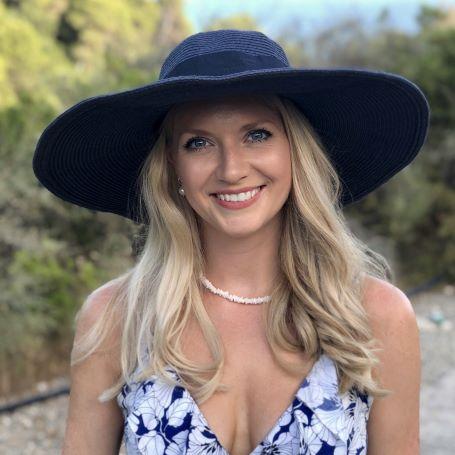
On 3 October 2023, 34-year-old Virginia was cycling to her job at the time in the Department for Business and Trade, along a route she had been cycling for six years. Her Tuesday-morning commute was going smoothly as she approached the final stretch to the office, cycling along Chelsea Embankment. All of a sudden, in a narrow section of the cycle lane, her bike collided with another bike and she fell into a busy road.
“I landed on the floor and simply could not move,” said Virginia. “I was in pure agony, lying face down on the road. I remember screaming, screaming endlessly for help.
“Before the accident I was an active person – I had completed the 100-mile Ride London race that year and I’d been training for the Royal Parks half marathon later that week. Then in the blink of an eye, I was lying on the floor, unable to move, panicking that I was going to be paralysed for the rest of my life.”
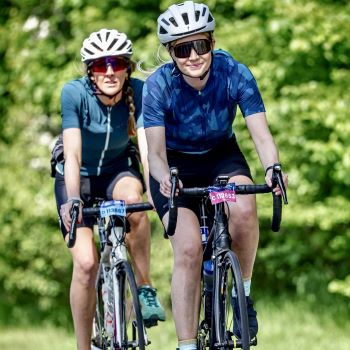
The accident left Virginia seriously injured on the road. London’s Air Ambulance’s advanced trauma team was dispatched to the scene, bringing procedures usually only found in the emergency department to Virginia’s side.
On arrival our team found Virginia in a critically unwell state with London Ambulance Service paramedics beginning their assessments and treatment. It was apparent Virginia needed the advanced trauma care of London’s Air Ambulance.
Virginia was suffering from 24 fractures to her ribs, bone fragments from which were digging into her lungs and creating punctures. This led to both of Virginia’s lungs collapsing – a life-threatening position to be in. Our crew was able to perform a thoracostomy on the roadside: cutting into Virginia’s chest to release the pressure and help the lungs to reinflate, while providing her with very strong painkillers, medication that only London’s Air Ambulance can administer.
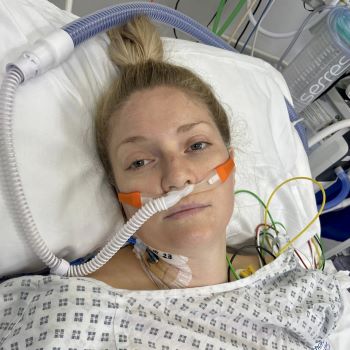 Owing to how badly her lungs were injured, they also anaesthetised and intubated Virginia to take control of her breathing and ensure maximum oxygen intake. The team were very concerned that Virginia was bleeding internally and had lost a lot of blood. With very low blood pressure and a high heart rate, Virginia remained in a critical condition. Therefore they provided her with four units of blood at the scene, another procedure only our crew can do. Once she was more stable, our team accompanied her in a road ambulance to the nearest major trauma centre.
Owing to how badly her lungs were injured, they also anaesthetised and intubated Virginia to take control of her breathing and ensure maximum oxygen intake. The team were very concerned that Virginia was bleeding internally and had lost a lot of blood. With very low blood pressure and a high heart rate, Virginia remained in a critical condition. Therefore they provided her with four units of blood at the scene, another procedure only our crew can do. Once she was more stable, our team accompanied her in a road ambulance to the nearest major trauma centre.
Virginia remained unconscious for a day before she began to wake up. She spent 11 days in an Intensive Care Unit (ICU) and then two further weeks in a major trauma ward. Among the fractures, they found she also had grade four lacerations to both her liver and spleen.
“I remember waking up,” said Virginia. “The first thing the ICU doctors told me was that my spine and my spinal cord thankfully hadn’t broken and that I was going to be okay long-term. I was so relieved, so thankful. It was an immense relief.”
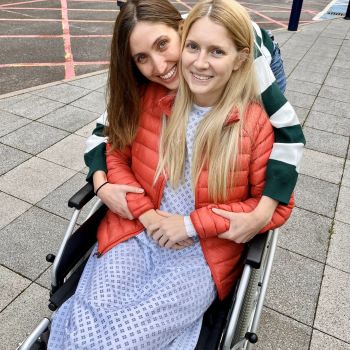 Virginia then began a hard and painful journey to rebuild and regain her strength. “Learning to fully re-expand my lungs took months. When the doctors asked me to stand up for the first time, it felt like an elephant was sat on my back.”
Virginia then began a hard and painful journey to rebuild and regain her strength. “Learning to fully re-expand my lungs took months. When the doctors asked me to stand up for the first time, it felt like an elephant was sat on my back.”
Pain and fatigue were the two main hurdles for Virginia: “I was in so much agony from the broken ribs – every breath, cough, sneeze and yawn was horrific. I also lost so much muscle from being confined to a bed for so long, I felt incredibly weak with very little energy.”
Despite a setback in December, when Virginia had to be re-admitted to ICU for three days with a re-collapsed lung, Virginia continued to work steadily at her recovery.
“When I left the hospital I gradually started to walk short distances on my own and made sure to reach a little further every day.
“As soon as I found out that I’d survived and heard that I wasn’t paralysed, I felt a strong resolve to get better and back to my normal life. I also felt so grateful and astounded when I heard that one of the services that saved me was a charity – I’m so thankful to the doctors, paramedics and pilots who were involved in my rescue that day.
“I wouldn’t be here today without that team and the crucial steps they took on the roadside to save my life.”
Now, in spring 2024, Virginia has returned to full-time work, in a new job working for the Foreign, Commonwealth and Development Office: “I have wanted to work for the Foreign Office since I was 18, so it’s a dream come true that they waited for me through my recovery!”
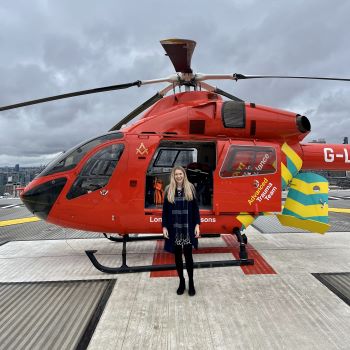
She is also back to exercising, fundraising for London’s Air Ambulance Charity and preparing for her first holiday since the accident.
“I’m hoping to do the Royal Parks half marathon this year, having missed last year’s while in hospital!” exclaimed Virginia. “The doctors have warned it might be a little too ambitious, but I am feeling stronger each day. It’s my goal and a great milestone to work towards.”
We’re so thrilled to see Virginia’s brilliant recovery and wish her all the best for her endeavours this year. Recently, the two doctors who attended to Virginia met her at our helipad and talked her through what the team did for her.
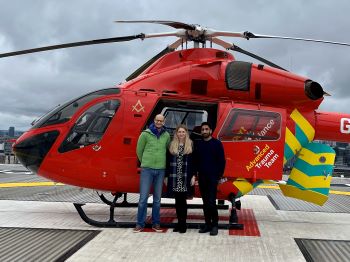
“It was amazing to meet the doctors who saved me! I feel so lucky to have survived and so thankful to them. I also want to thank the people who set up this life-saving service in the first place: without them, no one would have come to my rescue.”
Virginia was grateful to have family and friends visit her every single day in hospital for 25 days – providing a source of motivation to keep going and stay positive. Now, she offers this advice to anyone else who’s struggling after an accident.
“Having positive messages and supportive people around you helps you keep an optimistic mindset, which is such an essential part of recovery. Invest time into your healing, do the physio exercises and truly believe that you will eventually recover and get back to the life you want to have.”

